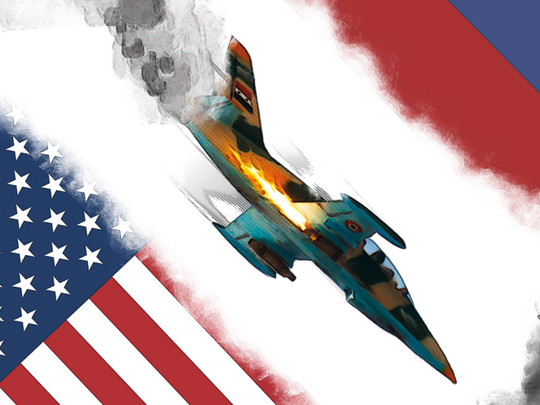
United States President Donald Trump’s plans to build a more constructive relationship with Moscow may have hit a roadblock, now that the US military has shot down a Syrian warplane. No matter how much Trump hankers after better relations with the Russians, the downing of the Syrian Air Force’s Russian-made SU-22 recently has effectively extinguished any prospect of Washington and Moscow enjoying a new era of detente.
Tensions between the two powers were already running high after a bipartisan group of US senators last week voted overwhelmingly to pass a bill that expands financial sanctions in retaliation of Russia’s interference in last year’s presidential contest, as well as Moscow’s illegal annexation of Crimea in 2014. The move, which comes when the Trump administration is being scrutinised over allegations of links with the Russians, also undermines the president’s often-stated desire to engage with Moscow. The prospects of Trump achieving this goal, though, look even more remote following Moscow’s robust response to the shooting down of the plane.
The aircraft was destroyed after it bombed positions held by the US-backed Syrian Democratic Forces (SDF), one of the main rebel groups battling Daesh (the self-proclaimed Islamic State of Iraq and the Levant) in Raqqa, its stronghold in northern Syria. The Russians, who are committed to keeping the regime of Syrian President Bashar Al Assad in power, have responded by warning that they could target American and British jets operating in Syrian airspace as part of the coalition effort against Daesh. They are also threatening to end cooperation with the incident-prevention hotline set up to prevent accidents in the crowded skies over Syria. If the incident represents yet another setback for Trump’s plans for improved ties with Moscow, it also highlights the deepening chasm that is developing between Russia and the West over their competing ambitions in Syria, as well as the rest of the Middle East.
For the West, the overriding priority remains the destruction of Daesh, the group accused of encouraging the recent wave of terrorist attacks in Europe. The focus of the campaign is concentrated on driving the militants from their strongholds in Mosul, Iraq’s second city, as well as Raqqa. Trump has made destroying Daesh one of his main foreign policy objectives, and to this end he has given senior officials, such as Defence Secretary James Mattis and H R McMaster, the National Security Adviser, more leeway to prosecute the war against Daesh.
Consequently, there has been a significant uplift in coalition activity, particularly around Raqqa, where coalition commanders believe Daesh will soon be defeated with the help of the SDF, a mixture of Kurdish and Arab fighters, which provides the main ground component for the assault. The Russians, too, claim they are committed to destroying Daesh, although the reality is that they are more interested in consolidating their military investment in Syria by keeping Al Assad in power.
Al Assad wants to defeat the rebel groups, not tackle Daesh, which means that Russian objectives are often at odds with those of the US coalition, particularly in relation to groups like the SDF, which is viewed as a vital ally by Washington and London, but as a rebel faction by Al Assad and his supporters. The situation on the ground, moreover, is further complicated by the long-term ambitions of Iran, which, after Russia, is the Al Assad regime’s other main backer.
Prior to the conflicts in Iraq and Syria, Iran had to rely on its air link with Damascus to maintain and supply Hezbollah, the terrorist organisation it set up in neighbouring Lebanon to confront Israel. But with large tracts of Iraq and Syria now, in effect, beyond government control, Iran’s Revolutionary Guards sense an opportunity to build a land corridor through Iraq and Syria that would link Iran to the eastern Mediterranean. The Iranians, moreover, signalled their seriousness about achieving this potentially divisive goal by firing half a dozen ballistic missiles last week at Daesh targets in Syria.
One of the reasons we are seeing this more assertive conduct on the part of Tehran and the Al Assad regime is that they are looking ahead to when the West’s anti-Daesh campaign has been concluded, and the spoils of war are decided. Western leaders frequently talk about the need to destroy Daesh, but less is said about their post-war expectations for Syria and Iraq. This ambiguity has led Al Assad and his Iranian backers to conclude that Western interest in the region will eventually abate, giving Damascus and Iran an opportunity to decide its fate. And, as Russia is also closely allied with both Al Assad and Iran, even Trump must realise there can be no realistic prospect of reconciliation with Moscow so long as it supports two of America’s most bitter foes.
— The Telegraph Group Limited, London, 2017
Con Coughlin is the Daily Telegraph’s defence editor and chief foreign affairs columnist.








